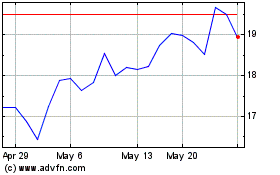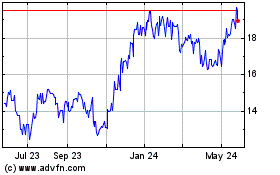S&P Warns Over Commercial Property Values if U.K. Leaves EU
08 April 2016 - 12:00AM
Dow Jones News
U.K. commercial real-estate values could fall if Britain votes
to end its European Union membership in June, credit-rating firm
Standard & Poor's Corp. said in a report on Thursday.
The U.K. is set to hold a referendum over its relationship with
the EU on June 23. Uncertainty leading up to the public vote "is
likely to have a paralyzing effect on investor decisions on U.K.
real-estate purchases," Marie-Aude Vialle, a credit analyst at the
credit-rating firm, said in a statement.
Exiting the EU "could potentially reverse the significant boost
to real-estate asset values that the U.K., and London in
particular, has experienced in recent years," S&P said in a
report.
Office buildings in London's main financial district, called the
City, would be worst hit, S&P said. Although less so than
commercial real estate, housing markets, especially in London, are
also susceptible.
S&P is the latest group to warn of a negative impact for the
U.K. property markets due to the referendum. The company has
previously said its stance on U.K. government credit could suffer
should Britain part ways with the EU.
Overseas investors have already been pulling back from London
commercial property, such as offices and shops, due to concerns
about slowing global economic growth and the collapse in oil
prices.
Foreign buyers have long perceived that U.K. property provides a
haven from political and financial volatility. A vote to leave the
EU in June "would likely threaten that perception of safety," the
S&P report said.
S&P has ratings on several U.K. property companies,
including Derwent London PLC, Kennedy Wilson Europe Real Estate
PLC, Grainger PLC and Taylor Wimpey PLC.
"Brexit would be overall a negative rating event that we would
need to evaluate versus the financial cushion they have amassed at
their current rating level," the report said.
In addition to weaker demand for property, banks and other
financial services firms could choose to reduce office space in
London, causing rents to fall.
However, large U.K. real-estate firms have benefited from the
recent property boom, and have lower levels of debt compared with
the value of their assets—the so-called loan-to-value ratio—than in
the 2008 financial crisis, S&P said.
"This provides a large degree of cushion to LTV ratios for large
office players in the U.K. should property valuations drop," the
report said. For instance, Derwent London had a loan-to-value ratio
of just 17.8% in December, compared with nearly 40% in December
2008, S&P said.
Write to Art Patnaude at art.patnaude@wsj.com
(END) Dow Jones Newswires
April 07, 2016 09:45 ET (13:45 GMT)
Copyright (c) 2016 Dow Jones & Company, Inc.
Taylor Wimpey (PK) (USOTC:TWODY)
Historical Stock Chart
From Jan 2025 to Feb 2025

Taylor Wimpey (PK) (USOTC:TWODY)
Historical Stock Chart
From Feb 2024 to Feb 2025
